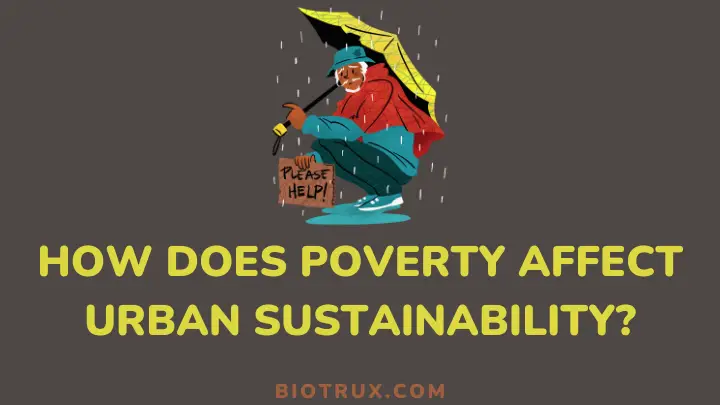Poverty is not only a social problem but also an environmental one. How so? Well, poverty can affect urban sustainability in many ways. Urban poverty is the condition of living in a city with insufficient income, resources, or opportunities to meet one’s basic needs.
It is a complex and multidimensional phenomenon that affects millions of people around the world. Urban poverty also has significant implications for the sustainability of cities, which are facing unprecedented challenges such as population growth and social inequality.
In this article, you will explore how urban poverty affects various aspects of urban sustainability. The goal of this article is to inform and inspire you to learn more about this important topic and to take action in your own communities.
1. Innovation Stifled by Economic Hardship
Innovation is the process of creating new and better solutions to existing problems. However, innovation requires resources such as capital, education, infrastructure, and human talent.
When people are struggling to meet their basic needs, they have less time, energy and resources to invest in creative solutions for the challenges they face. For example, a poor person may have a brilliant idea for a renewable energy device but may not have the money or facilities to develop and test it.
In addition, in some slums, residents have devised ingenious ways to collect rainwater, recycle waste, or generate electricity. However, they still face barriers such as a lack of land tenure, legal recognition, or financial support to scale up their initiatives.
Therefore, poverty limits the potential for innovation and reduces the chances of finding sustainable solutions for urban challenges.
2. Limited Civic Participation and Its Impact
Civic participation is the involvement of citizens in the decision-making processes that affect their lives. It is one of the ways to promote urban sustainability, which is the ability of cities to meet the needs of the present without compromising the future.
However, poverty can limit civic participation and its impact in various ways, thereby hindering urban sustainability. For example, poor people may lack access to information, education, resources, or opportunities to participate in public affairs.
They may also face discrimination, exclusion, or repression from the authorities or other groups. This can reduce their voice, influence, and representation in urban governance and development.
As a result, their needs and interests may be ignored or marginalized, and their rights and entitlements may be violated or denied. This can worsen their living conditions and increase their vulnerability to social, economic, and environmental challenges.
3. Poverty’s Strain on Infrastructure
Poverty can have a negative impact on urban sustainability by putting pressure on the infrastructure of cities. Poor people often live in overcrowded and informal settlements that lack basic services such as water, sanitation, electricity and waste management.
These conditions can increase the risk of disease outbreaks, environmental degradation and social unrest. Poverty can reduce the ability of local governments to invest in and maintain the infrastructure that supports urban development. This includes roads, public transport, schools, and health facilities.
This can affect the quality of life and economic opportunities of all urban residents, especially the poor. To address this challenge, cities need to invest in inclusive and resilient infrastructure that can meet the needs of all urban dwellers.
4. Impacts on Public Health
Public health is a key factor for urban sustainability, as it affects the well-being, productivity and resilience of the population. Poverty can have negative impacts on public health in several ways.
They include increasing the exposure to environmental hazards, reducing the access to health care and nutrition, and weakening the social cohesion and support. For example, poor people living in slums may face higher risks of infectious diseases, malnutrition, violence and mental stress.
These health issues can impair their ability to work, learn and cope with challenges. Therefore, addressing poverty and improving public health are essential steps for achieving urban sustainability.
5. Limited Education Opportunities
One of the ways poverty affects urban sustainability is by limiting educational opportunities for the residents. Education is essential for developing human capital, enhancing social mobility, and fostering innovation and creativity.
However, many urban poor dwellers lack access to quality education due to factors such as inadequate infrastructure, insufficient funding, high dropout rates, and social discrimination. This creates a cycle of poverty and inequality that undermines the social, economic, and environmental dimensions of urban sustainability.
For example, limited education may reduce the employability and income of the urban poor. This leads to more pressure on the already scarce resources and services in the city.
It may also limit their awareness and participation in addressing the challenges and opportunities of urban development. Therefore, improving educational opportunities is a key strategy for breaking the poverty trap and enhancing urban sustainability.
6. Substandard Housing Conditions
Substandard housing conditions are a major challenge for urban sustainability. They often result from poverty, which limits access to adequate and affordable shelter for many people. Substandard housing conditions can have negative impacts on the environment, health, and social cohesion of urban areas.
For example, substandard housing may lack proper insulation, ventilation, or sanitation, which can increase energy consumption, greenhouse gas emissions, and disease transmission.
Substandard housing can also create social problems, such as crime, violence, and discrimination, which can undermine the quality of life and well-being of urban residents. Therefore, improving housing conditions is a key step towards achieving urban sustainability.
7. Transportation Challenges
Transportation challenges are one of the ways poverty affects urban sustainability. Poor people often lack access to affordable, safe and reliable transport services, which limits their mobility and opportunities for education, health, employment and social inclusion.
Moreover, transport systems in many cities are inefficient, polluting and congested, which undermines the environmental and economic sustainability of urban areas. A relevant example is the case of Lagos, Nigeria.
The majority of the population relies on informal and unsafe modes of transport, such as motorcycles and minibuses. These vehicles contribute to high levels of noise and air pollution, as well as road accidents. Therefore, improving transportation systems is crucial for enhancing urban sustainability and reducing poverty.
8. Increased Crime Rate
Poverty affects urban sustainability in many ways, and one of them is the increased crime rate. When people are poor, they may resort to illegal activities to survive or cope with their situation, such as theft, drug trafficking, or violence.
This undermines the social cohesion and safety of the urban community and creates more costs for law enforcement and justice. The emergence of favelas in Rio de Janeiro, Brazil, has been caused by poverty and inequality, and gangs and drug lords operate with impunity. This makes the city less livable and attractive for residents and visitors alike.
9. Limited Access to Basic Services
Limited access to basic services, such as water, sanitation, health, education, and transport, is one of the ways poverty affects urban sustainability. Without these services, people living in poverty face multiple challenges that undermine their well-being and livelihoods.
For example, lack of clean water and sanitation can lead to diseases and environmental degradation. Lack of health and education can limit the opportunities and skills of the poor. Lack of transport can isolate them from markets and social networks.
These factors can create a cycle of poverty and vulnerability that hampers the development of urban areas and their resilience to shocks and stresses.
10. Unemployment and Underemployment
Unemployment and underemployment are factors that contribute to poverty and undermine urban sustainability. When people lack decent jobs or income opportunities, they struggle to meet their basic needs and improve their living conditions.
This can lead to social problems such as crime, violence, poor health, and low education. Moreover, unemployment and underemployment can have negative environmental impacts, such as increased waste generation, pollution, deforestation, and greenhouse gas emissions.
For example, in some cities, informal workers rely on scavenging or burning waste materials for their livelihoods, which can harm their health and the environment. Therefore, addressing unemployment and underemployment is essential for achieving urban sustainability and reducing poverty.
11. Social Inequality and Exclusion
Social inequality and exclusion are factors that undermine urban sustainability, as they create conditions of vulnerability, marginalization, and injustice for many people.
Poverty affects urban sustainability by limiting access to basic services, such as health, education, water and sanitation. It also limits opportunities for social and economic participation and empowerment.
For example, slum dwellers often face discrimination, violence and environmental hazards, which compromise their well-being and human rights. To achieve urban sustainability, it is essential to address the root causes of poverty and inequality and to promote inclusive and equitable development for all.

FAQs
Can poverty be completely eradicated from urban areas?
Targeted efforts and policies can significantly reduce poverty’s impact on urban sustainability, although complete eradication remains a challenge.
What role can businesses play in alleviating poverty in urban settings?
Businesses can contribute by adopting fair labor practices, supporting community development initiatives, and providing job opportunities.
How does education act as a catalyst for breaking the cycle of poverty in cities?
Education equips individuals with skills and knowledge, empowering them to escape the cycle of poverty and contribute meaningfully to urban development.
Are there successful examples of cities overcoming the challenges posed by poverty?
Yes, some cities have implemented innovative solutions, such as inclusive urban planning and targeted social programs, to address poverty and enhance sustainability.
What can individuals do to support urban sustainability efforts in poverty-stricken areas?
Individuals can contribute by supporting local businesses, advocating for inclusive policies, and participating in community-led initiatives aimed at alleviating poverty.
Final Thoughts
Poverty undermines the efforts to create sustainable and livable cities for all. Poverty affects urban sustainability in many ways, such as increasing pollution, reducing green spaces, limiting access to basic services, and exacerbating vulnerability to disasters.
To address these challenges, we need to adopt a holistic and inclusive approach. This approach considers the needs and rights of the poor, as well as the environmental impacts of urban development.
We need to promote social justice, economic opportunity, and environmental stewardship in our cities. By doing so, we can create a better future for ourselves and our planet.
You can also read up on urban sustainability trends.
Thanks for reading.

